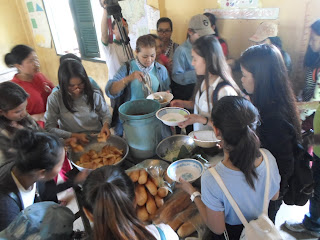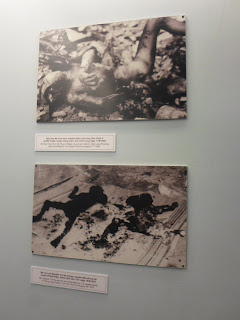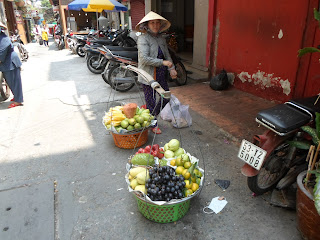On King Sihamoni's birthday this year, I took a break from work to visit an elementary school in Takeo province. The field trip was organized by the university I work for to give back to communities in the rural poor. It was an eye-opening experience, and I'm better for it.
Having seen the simple conditions of the villagers, I was reminded of how lucky I've been (and still am). The elementary school we visited was built 10 years ago, and it currently serves three villages in that province. Many of the students go to school there either on foot or on bicycle. The classrooms are basic with wooden tables and benches. A chalkboard is centered in front of each classroom. Of lavatories, there are only 3 (2 for all students, and 1 (padlocked) for teachers). The public school teachers there receive a pittance sum of $150 a month for salary - apparently less than many construction and garment factory workers in Cambodia. Education is obviously not a top priority for the Cambodian government, or they would have invested more in teachers' salaries and development. In front of the school, there is a man-made reservoir built with private funds donated by a philanthropist. It is filled with lotus plants (said to be natural water purifiers the mechanics of which I still don't fully understand). From this pond, many families draw water for their daily use. There are no mini-marts or air-conditioned cafes in the village. Instead, there is a make-shift stand that sells ice-cold drinks and snacks near the school.
I was heartened to witness the interactions between our college youths and the young ones from the villages. Feeling shy and foreign at first, both groups of students soon warmed up to one another. Then they broke into several groups and commenced playing games. The communal spirit and solidarity were strong and genuine. There was no foreign entity poking his/her ugly nose into someone else's business. This was pure grassroots community outreach by Cambodians for Cambodians. I also witnessed first-hand the passion for change and hope that many Cambodian youths have for their own future. A number of those I spoke with believe in effecting change themselves as they are none too pleased with the Cambodian government's track record. They deem their government to be impotent, corrupt, and unreliable. I have nothing but respect and good wishes for these youths.
Having seen the simple conditions of the villagers, I was reminded of how lucky I've been (and still am). The elementary school we visited was built 10 years ago, and it currently serves three villages in that province. Many of the students go to school there either on foot or on bicycle. The classrooms are basic with wooden tables and benches. A chalkboard is centered in front of each classroom. Of lavatories, there are only 3 (2 for all students, and 1 (padlocked) for teachers). The public school teachers there receive a pittance sum of $150 a month for salary - apparently less than many construction and garment factory workers in Cambodia. Education is obviously not a top priority for the Cambodian government, or they would have invested more in teachers' salaries and development. In front of the school, there is a man-made reservoir built with private funds donated by a philanthropist. It is filled with lotus plants (said to be natural water purifiers the mechanics of which I still don't fully understand). From this pond, many families draw water for their daily use. There are no mini-marts or air-conditioned cafes in the village. Instead, there is a make-shift stand that sells ice-cold drinks and snacks near the school.
I was heartened to witness the interactions between our college youths and the young ones from the villages. Feeling shy and foreign at first, both groups of students soon warmed up to one another. Then they broke into several groups and commenced playing games. The communal spirit and solidarity were strong and genuine. There was no foreign entity poking his/her ugly nose into someone else's business. This was pure grassroots community outreach by Cambodians for Cambodians. I also witnessed first-hand the passion for change and hope that many Cambodian youths have for their own future. A number of those I spoke with believe in effecting change themselves as they are none too pleased with the Cambodian government's track record. They deem their government to be impotent, corrupt, and unreliable. I have nothing but respect and good wishes for these youths.
Next post: Chisor Mountain, Takeo Province, Cambodia - May 13, 2016
Previous post: Ho Chi Minh City, Vietnam (10 Years On) - April 13-17, 2016











































































































